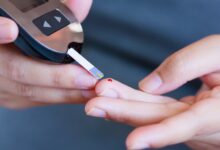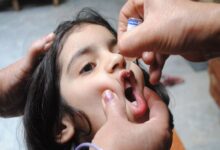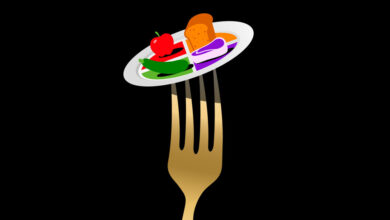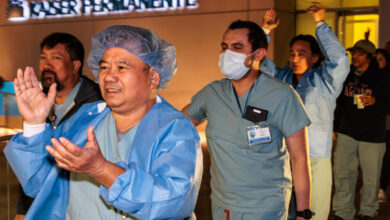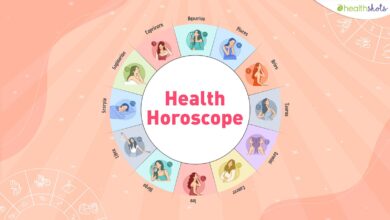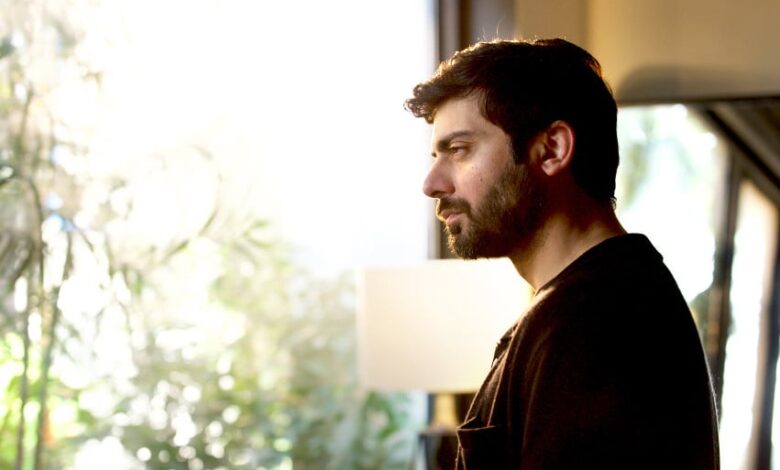
Tech meets wellness: Fawad Khan shares | The Express Tribune
[ad_1]
Get to know the nation’s heartthrob, Fawad Khan, as he shares stories about his childhood, teenage years, the unexpected twist when diagnosed with Type 1 Diabetes at the age of 17, and the transformative role Abbott’s FreeStyle Libre system played in his life.
1. Interviewer: Childhood memories are usually sweet. But when you are Fawad Khan, an icon and inspiration for millions; unearthing the true Fawad Khan beyond the star is key. There are a lot of defining moments that come in front of you, which made Fawad, Fawad Khan. Let’s go back down memory lane and tell us something about your childhood and teenage years.”
Fawad: I had a pretty alright childhood, very normal, nothing extraordinary in that way. I was born in Karachi, and due to my father’s job, we moved around quite a bit. We lived in Athens for two years, then Dubai, followed by Riyadh, and during the Gulf war, we briefly stayed in Manchester. Eventually, we settled down in Lahore.
I attended LGS (Lahore Grammar School), and after schooling, I enrolled in a Computer College where we learned a bit about Computer Sciences. During that time, I was part of an underground band where my journey in acting began, mainly as a hobby with a monthly income of Rs12,000.
Back then, I felt like the richest guy in class, and my friends and I would pool Rs10 to Rs15 each to go and enjoy a burger or something similar. I have fond memories of my college and school days, and that’s how I started my career, leading me to where I am today as the Fawad you see now.”
2. Interviewer: Talking about your childhood, one moment came in your life that created a complete paradigm shift; a new turn of events. Can you tell us something about it?
Fawad: When I was 17 years old, my body experienced an auto-immune response, which led to the condition known as Type 1 Diabetes. It happened after I had a bout of high fever, during which I lost around 10 kilograms of body weight in just eight days. I used to weigh 65 kilograms, but my weight dropped to 55 kilograms.
Soon after, I noticed an increased thirst, a condition called Polyuria, which meant I frequently needed to use the bathroom due to excessive water intake. Despite drinking six to seven litres of water, my mouth remained dry due to dehydration.
Recognising the symptoms, my GP conducted a blood sugar test, which revealed my blood sugar level was at 600. I was checked in at the hospital and was rehydrated and given insulin and I have been on insulin since the age of 17, today at this day, I am 41, so it’s been a career in diabetes for 24 years.
3. Interviewer: If you would tell us a little about the moment, when you first found out you had diabetes, obviously for a young guy life is happening, you’re in a certain phase and state in life. How was that moment?
Fawad: Before Diabetes, I was very active in school, playing every sport. But after the diagnosis, my interest in sports vanished completely, and I felt constantly tired. The initial few months were tough, and I was always exhausted. I started following a diet regimen, and began administering insulin.
There is a “honeymoon period” when you get Diabetes, during which your pancreas still produces some insulin, giving you hope that it might improve or reverse. Honestly, when I was in the hospital, the impact didn’t hit me as hard as it hit my father.
He’s an emotionally stable person, but my mother says, it was one of the rare occasions she saw him emotionally affected. For the first two to three days, it didn’t fully sink in. However, during a trip back from Rawalpindi, sitting in the backseat, I had a breakdown and started crying, questioning why this had happened to me.
However, at the same time, I acknowledged that the world has numerous severe diseases. Diabetes is often misunderstood, and only those who have it can truly comprehend what they go through on a daily basis.
There was an emotional impact, especially on my father, more so than on me. Nonetheless, I believe that every cloud has a silver lining. I firmly hold onto the belief that when one door closes, a hundred others open. I am very fortunate and a very lucky person where I am today, but I don’t think I did that bad. I think I did pretty well for myself.
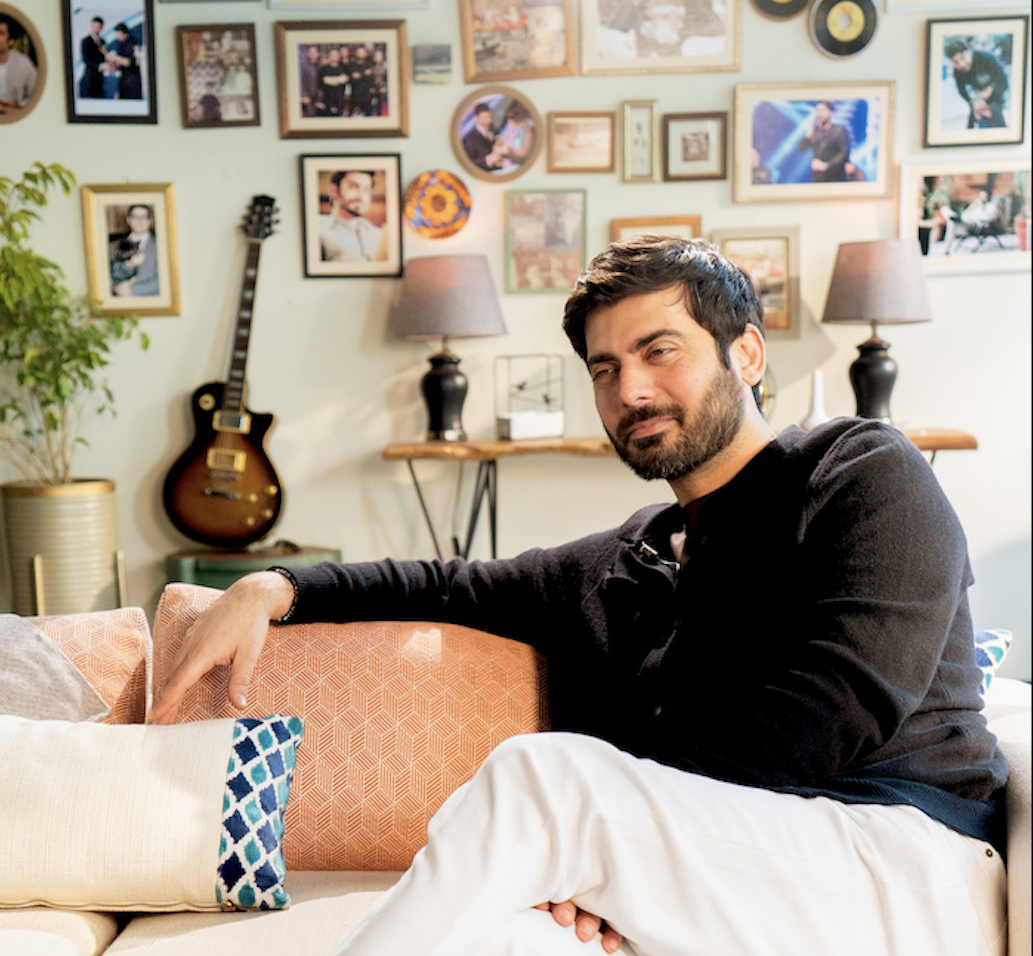
4. Interviewer: What would be your message for parents who are dealing with children?
Fawad: There was a parent who reached out to me once and asked, “what should I do. I’m from a different city and my child is suffering from Type 1 Diabetes.”
I said this is something that will stay for life, you need to show courage and if you show weakness it will portray on your child. And that is when my mother came in and recalled what she had said to my father, “If you tell him that he is weak today, then he will grow up with that weakness.”
I didn’t make it my handicap, with the limitations that I have. I don’t think you can experience it until I give you a dose of insulin, if I give you a dose of insulin, chances are that you would die. At times I have even felt, when my sugar gets low it seems like your soul is being sucked out and I would sometimes fall on the floor and it’s hard to breathe, I would sweat.
There was a point where one of my eyes would start to roll up, like one would stay here and the other one would start rolling up, so I had no control over that as well. It has different affects.
You feel thirsty, you get aches in your calves, your legs, naturally diabetics lose a lot of muscle mass on their legs. They gain weight in their mid-area because you are constantly administering insulin, so yeah, an exercise regimen is needed. People don’t know what the impact is, they just know they have diabetes but it can be a harrowing experience.
Every time your sugar levels get low, you can feel it across your body I think there is not much awareness, there are polio awareness programs, right? Then why is there no diabetes awareness program? And honestly speaking because there is a lack of awareness regarding it, I don’t think that they take their disease seriously as well.
I think for the first two years, I controlled myself in the initial months. I was in first year of A-Levels at the time, and as the term progressed, I stopped caring about it. I’ll be very honest, I would have soft drinks all the time because I was angry and I wanted to live life the same as everyone else. It’s better you take care of yourself because you are going to have to live with it..
People aren’t educated about this, for example, we would be on tour as a band, and if my sugar levels go up or down (the Glucose Trend Arrow may not always appear with your reading), my band mate would be like, my blood sugar would have dropped, they would say should we administer insulin, I would be like what are you talking about, my blood sugar is down, if I inject insulin I would die, I am supposed to eat something.
What I am trying to say is that there is lack of awareness amongst people in regards to this disease. If a person is having an epileptic attack in front of you, well not really epileptic but literally at times you can just be on the floor and that has happened to me as well, where I am just having trouble breathing or talking because my sugar levels had become so low.
At that point, what is the first response? People don’t really know. All I’m saying is that we need to make school environments more conducive to being inclusive, in other words, own up to the disability if you have one.
You need to admit to it. Not hide it from the world. There were a lot of times where people would say not to tell anyone that you have Diabetes. And I asked why. The answer would be, people would think less of you or they will think that you won’t be able to do things.
I think I can do a lot of things. I feel proud of it. Don’t feel down. Don’t discriminate this. Don’t be embarrassed of it. Tell people that you have this ailment. We need to own up to it, what do I mean by this in particular? Well, make people aware of it, let them know we have it, and simultaneously increase awareness among people so that there is a way to handle this, because for a child, it is a traumatic event.
Back in the day we had sheets, the sheets had six slots; pre meal, post meal, pre meal, post meal. What the reading was before breakfast (fasting), what the random was, then for lunch. It was a whole chart paper that we got. I never filled the chart as it was a tedious task.
You prick (pricks are required if glucose readings do not match symptoms or expectations) your finger six times a day, but now we have better things to opt for rather than pricking continuously throughout the day.
I personally got into CGMS (Continuous Glucose Monitoring) back in 2014, now I’m using Abbott’s FreeStyle Libre system, and I think it’s a game changer, a good device and has great door-to-door service as well.
Currently I’m using this device. All you need to do is wear the sensor on your upper arm. It’s applied on the skin, simply take the reader out from your pocket, touch the reader to the sensor and you get your reading. Hence, you’re free of pricking yourself. It’s that easy!
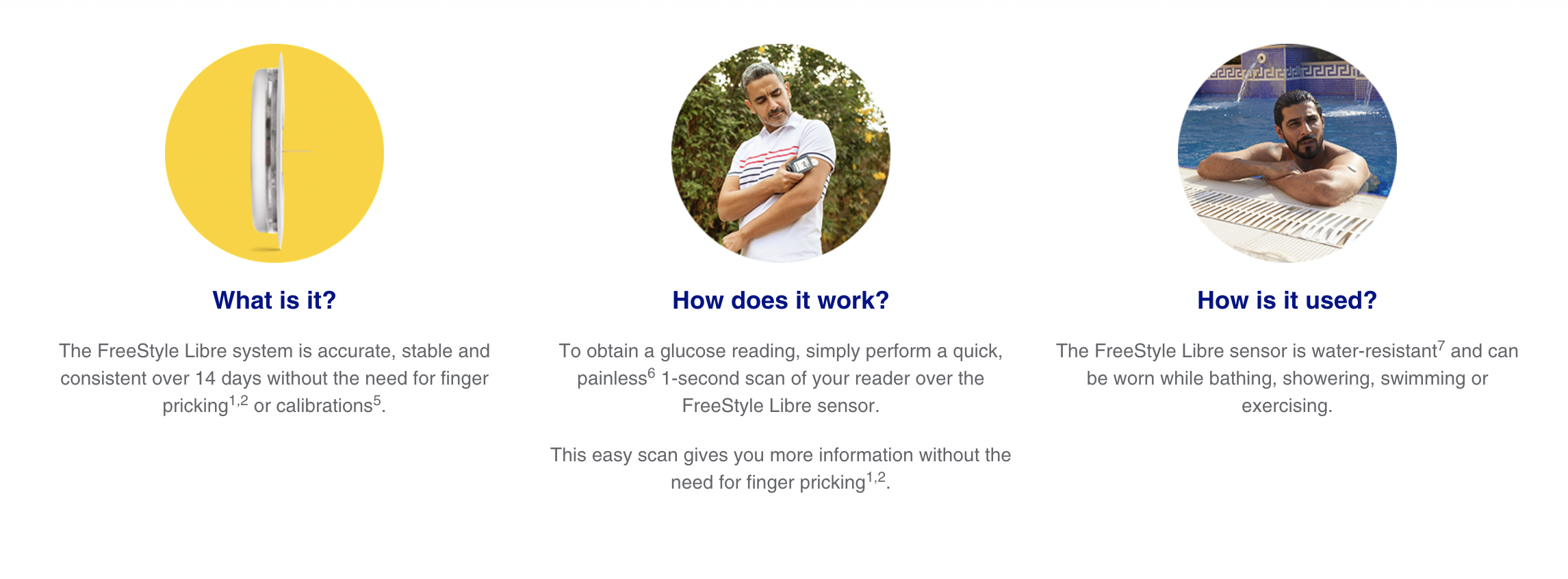
5. Interviewer: Fawad, you spoke about pricking, when you first had to prick yourself and pricking became a part of your life, how was that?
Fawad: Living with Diabetes involves frequent finger pricks, which can lead to calluses and small black dots on the fingers due to micro wounds. It becomes a constant routine with a lot of paraphernalia to manage – insulin, glucose meter, and other supplies.
Being forgetful, I often had to go back for these essential items before leaving. Carrying all the necessary equipment required a separate bag, making it inconvenient to be mobile and move around freely. I do wish I didn’t have to deal with it, but there are solutions and ways to manage the condition effectively.
6. Interviewer: Let’s talk about depression, connected with Diabetes. How were those depression episodes when you initially experienced them, what was going on and how does one deal with it?
Fawad: It’s like the chicken and egg argument; it’s difficult to determine what triggers. When you have a strong sense of purpose and determination, Diabetes or even other adversities like Cancer cannot hold you back. Mental strength plays a crucial role here. Great things can be accomplished when you utilise that energy positively.
7. Interviewer: Being an active musician, especially during live concerts with all the physical work and headbanging you were famous for, how did you manage your energy levels with Diabetes?
Fawad: Being young certainly helped with maintaining energy levels. Diabetes doesn’t mean you become handicapped, but there are limitations. When my blood sugar levels dropped, I had to eat something to keep my energy up. As a result, I had to be more calculated with my physical exertion and adjust my insulin dosage accordingly.
I remember a time when I underwent a physical transformation for a film role. I managed to go from a waist size of 36 or 38 (when I was overweight) to a waist size of 29 in just three months. It was a completely natural transformation achieved without any performance enhancement drugs.
I dedicated myself to the gym, spending 2.5 hours in the morning and evening. The key is to adapt your lifestyle to accommodate Diabetes, and with dedication, you can achieve anything. You need to titrate your lifestyle according to that and you can achieve anything.
8. Interviewer: Talking about body transformation, in Maula Jatt, it must have been a challenge, meaning in the movie Khoobsurat there was weight loss but in Maula Jatt it was completely like getting into a very different zone altogether. As someone who is constantly dealing with diabetes, that must have been a major health challenge as well?
Fawad: Yes there was, certain external help was required to achieve that physique and it was not a good idea. I would definitely not endorse that and would never advise you; sport physicians are there for a reason.
Diabetes was definitely an extra challenge. I experienced an episode of Acute Kidney Disease, and my kidneys started to shut down. I was in the hospital for like seven days. Such a worrying place to be; inside a hospital room, they had put me on a drip for a little while and I was out but yes luckily, I was safe and my kidneys had no scaring. I was back to work in no time.
9. Interviewer: Managing your glucose levels is very diet-centric, sometimes insulin is needed and sometimes you can just eat a snack to maintain sugar levels. Whenever your sugar gets high and there is a scene which requires you eating something, how do you manage then?
Fawad: You’ve asked a great question. You then take 20 insulin units and eat.
10. Interviewer: What would you do in that scenario?
Fawad: There are some good actors that do this. What I feel is that I am not that great of an actor. I, on the other hand would just eat it, so it looks real. I mean the kind of work that we are in, everyone will agree it’s the worst lifestyle. I am telling you that this is the worst lifestyle in the world.
I think in this lifestyle, there are very few people that keep themselves fit and work the same hours as well. But for a person like me, it becomes even more difficult because if you sleep at five in the morning and wake up in the afternoon, then when do you inject insulin and have a meal? It becomes just a bit more difficult.
It can be managed but it’s hard, you have to change your diet for those days. Obviously, seek advice from your physician before you do any such thing. Since I am a living example, I have done many experiments and at times things have gone south.
11. Interviewer: In terms of monitoring your glucose, obviously now you’re not pricking anymore, you have the FreeStyle Libre system with you and that one routine is finished, how do you feel, whats the difference?
Fawad: It’s much more convenient, it makes your life very easy. Pricking, thank God those days are gone. Why should you keep pricking your finger with blood coming out each time when you can just opt for the hassle free FreeStyle Libre and wear it on the back of your upper arm. It lasts for about 2 weeks; all you do is touch the sensor and you get your reading.
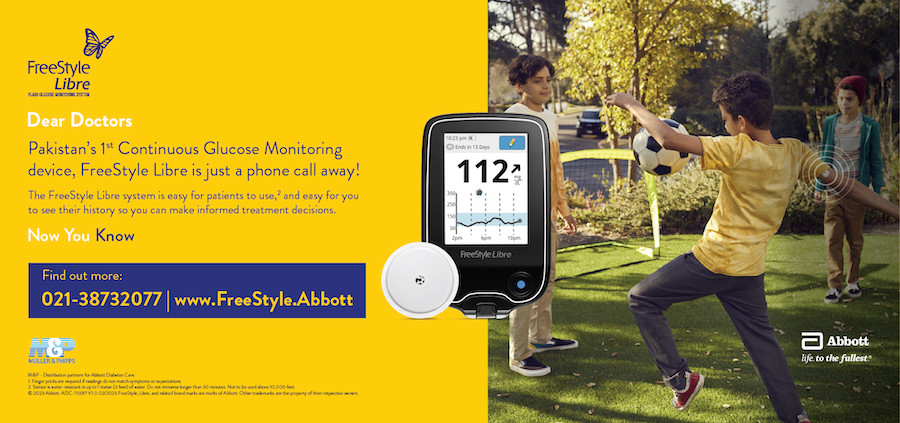
12. Interviewer: You have given us a lot of insight about your life, the way you’ve been fighting with Diabetes and living with it. We all know about the “domestic” remedies and the stereotypes associated with it.
Fawad: Few of them are, grind blackberry seeds and drink them with water or have bitter gourd juice. God forgive me! Others used to say, drink the water from this holy river and your “Sugar” will disappear. It’s sweet of them, but you would have to nod your head saying yes, I will try it. It hasn’t worked for me, I tried it and it does not work. It’s disgusting. Blackberry seeds, really?”
13. Interviewer: The way you talk about Diabetes awareness, it’s evident that people face stereotypes, discrimination, or simply lack awareness about it. What do you think can be done to address this issue?
Fawad: There should be a mass level awareness program, Anyone can take the initiative, but it must be done. Many people remain unaware of their Diabetes until it’s too late because they don’t recognise the symptoms.
Moreover, these programs can educate youngsters about not mocking people with diseases. It’s a community-building exercise, and there is hope. Although it’s a life-long condition, focusing on your health can make a significant difference.
There will be hurdles and challenges, If at times you feel overwhelmed or hurt, it’s important to seek support and find ways to lighten your heart.You have the ability to overcome anything. There is always a light at the end of the tunnel.
14. Interviewer: If you go back today, what would you say to that 17-year old boy, that same Fawad?
Fawad: Always follow your gut. Your first instinct is always the right one. Regarding diabetes, you should be more careful.The world does not owe you anything, right? you’re born into a world where you would have to create your opportunities. You’ll have to make yourselves strong enough to compete in those times. you would have to adapt yourself, the world will not change.
I would give my 17-year-old self this advice: When you face rebellion and anger in life, roll with the punches. Tomorrow will be a better day. The time of difficulty is when you succeed the most. You won’t appreciate the ups in life if you don’t know the downs. The lower you are, the higher the feeling when you rise.
Looking back, this is a story of survival. Survival of the fittest doesn’t just mean physical fitness; taking care of your mind matters too. They say mind over matter, and the rest will be taken care of.
To all the kids out there, even if there are 10 of you in a classroom, know that by saving yourself every day, you are stronger than those around you. Don’t lose hope. You are the heroes of your own lives.
A few last words for the parents from Fawad Khan: To all the parents dealing with children with diabetes, I want to say this:
Show courage and strength, and avoid displaying weakness. Your attitude will have a significant impact on your child’s outlook towards the condition.
Be supportive, proactive, and educate yourselves about diabetes. Encourage your child to live a healthy and balanced life, and create an environment where they feel comfortable and empowered. Together, we can raise awareness and make a positive difference in the lives of those living with diabetes.
[ad_2]
Source link
